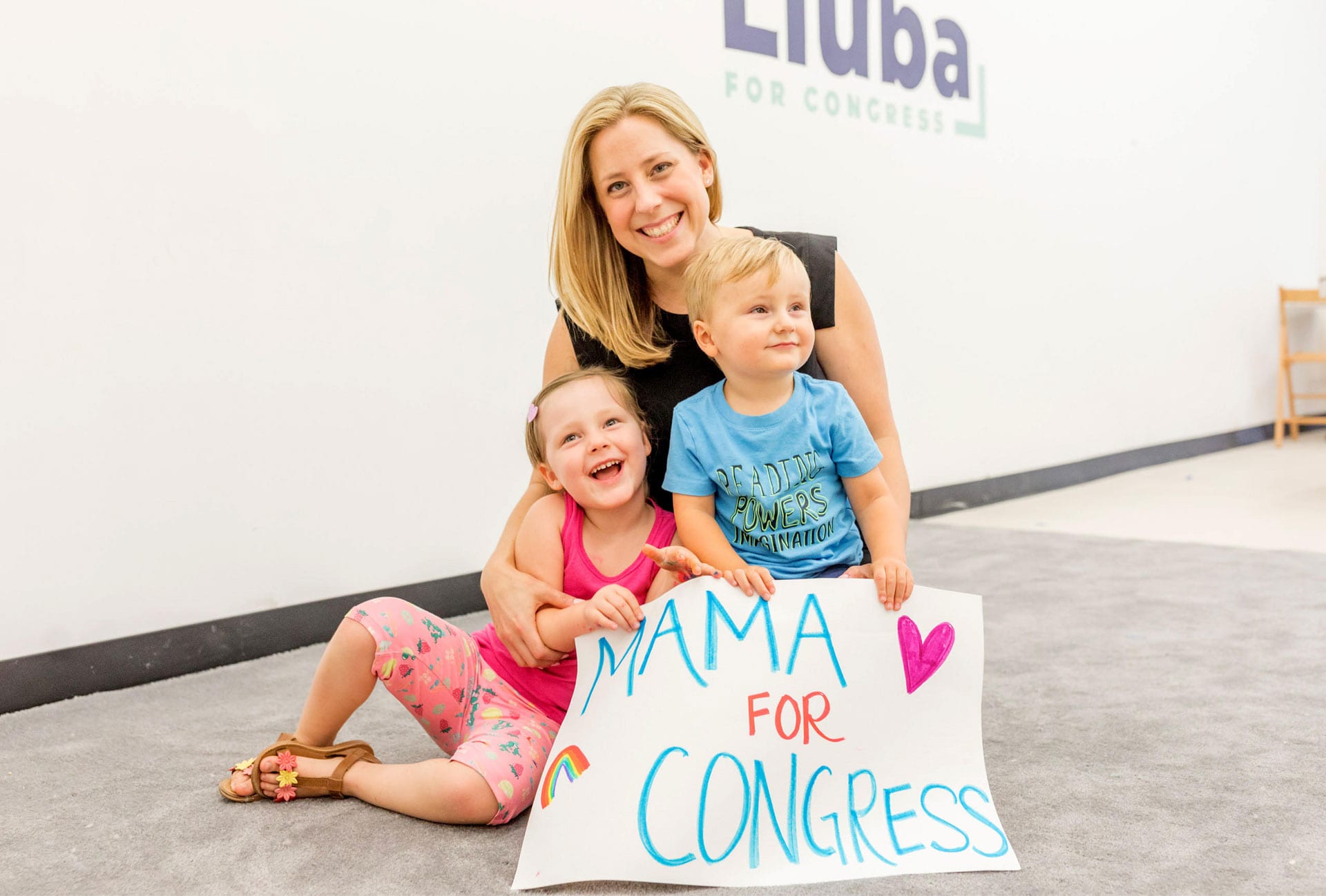Amy Solomon just needed clarity.
Solomon, a first-time candidate running for the Delaware House of Representatives and mother of two, wanted to know whether she could use campaign funds for child care expenses during her candidacy. She wrote in June to State Election Commissioner Anthony Albence, the top official in Delaware tasked with addressing campaign spending issues.
Solomon knew that existing Delaware code did not specify child care as an allowable expense. It was a point Albence’s staff made, too, in their initial response. But Solomon continued to press the matter.
“To me it’s a no brainer,” the 44-year-old Solomon told The 19th. “It’s an equity issue.”
The final decision arrived on August 21 in an email from Albence, who wrote in part that “the list of permitted campaign expenses is an exhaustive list and is not subject to further interpretation.”
Solomon was struck by the brevity. The Democrat had, by that point, written several lengthy emails to the office, calling and leaving messages along the way. Others wrote letters on her behalf. Her final push included a spreadsheet detailing her recent child care expenses, which at the time totaled more than $3,200.
And it all ended with three short paragraphs from Albence.
“For Commissioner Albence not to get on the phone with me … the answers so very short and curt and unwilling to look outside one specific code,” she said. “I felt very disappointed and not heard.”
Albence did not respond to a request for comment from The 19th.
Candidates’ options for child care have changed considerably in recent years, after the Federal Election Commission ruled in 2018 that a candidate could utilize campaign funds for child care expenses incurred as a direct result of campaign activity.
But the ruling did not apply to state and local candidates, only federal. That limitation helped create what exists today: a patchwork of laws and administrative rules around the country for parents seeking elected state and local office.
Eighteen states allow the use of campaign funds for child care, according to the latest tally by Vote Mama, an organization that works toward electing more mothers into all levels of office and pushes for universal child care. Six of those states (California, Colorado, Minnesota, New Hampshire, New York and Utah) have settled the matter through statewide legislation. In the other states, candidates have searched for answers from election boards, commissions and other local officials.
Candidates, separated sometimes by just a few hundred miles, have wildly different experiences. Delaware code, as interpreted by Albence and his staff, does not allow child care as a campaign expense. Further north, New York changed its policy through state law in 2019.
Liuba Grechen Shirley, a former New York congressional candidate whose request to the FEC led to the 2018 ruling, called decisions like the one in Delaware “detrimental” to women candidates at a time when the pandemic has further complicated child care by limiting access to family and friends.
Grechen Shirley lost her congressional bid but launched Vote Mama, which is working to make child care an allowable campaign expense in every state by 2023. Since her ruling, 46 federal candidates — 27 women and 19 men — have used campaign funds to pay for child care.

Grechen Shirley spoke of a culture in politics in which candidates are sometimes discouraged by their own campaign managers from expensing child care because of misperceptions around child care being simply a personal expense.
“Not only do we want to make it legal that we can use it, but also normalize what it looks like,” said the mother of three. “There are a lot of people who are still afraid to use it because they don’t want to be judged.”
Many of the state level changes in child care policies were started by one candidate — Grechen Shirley believes they have all been women — raising the issue.
During the initial weeks of her campaign, Solomon reviewed a public database of states that had taken action on child care expenses. She noticed no challenge to the rules in Delaware.
Albence is an ex officio member of the state board of elections in Delaware, which is made up of 10 members appointed by the governor. But it’s Albence, nominated by the governor and approved by the state Senate in 2019, who develops “regulations, policies, procedures and guidelines” on issues related to elections, including the authority to issue advisory opinions.
Solomon first emailed Albence on June 19. Kenneth “Bo” McDowell, a campaign finance manager in Albence’s office, responded by pointing out that existing code does not specify child care expenses.
McDowell told Solomon that neither the state’s department of elections nor the commission had legal authority to expand the list of expenditures.
“The General Assembly would need to amend the statute in order to permit any additional authorized expenses,” he wrote on June 22.
McDowell did not respond to a request for comment from The 19th.
Solomon, with the help of Vote Mama, sent additional emails. Together they argued that there is broad language in other areas of Delaware code that could allow the use of campaign funds for child care during campaign-related activities. Although child care expenses may not be explicitly authorized, neither was it explicitly ruled out, they said, pointing out that election commissioners in other states had made rulings on a case-by-case basis.
Shané Darby joined Solomon in appealing for an advisory opinion. The 31-year-old single mother of three is in the midst of a Democratic primary for Wilmington City Council. She has sporadic child care options between family, friends and her children’s father.
Darby, a child behavioral therapist, helps lead Black Women in Power, an initiative in Wilmington that focuses on Black maternal health. She sees the commissioner’s decision as a roadblock for people who want to improve their communities.
“It’s unfair,” she said. “I don’t think they thought about all the different candidates and the different makeups of families and the barriers that can cause in running.”
Solomon also said babysitting availability will also be limited ahead of her September 15 primary.
“I feel a little bit hampered by my circumstance,” she said. “And that does affect my campaign.”
Valerie Longhurst, a Democrat in the Delaware Legislature, plans to examine the issue for the next legislative session in 2021, in part because of Solomon’s experience.
“If we want more women to participate in this process and we don’t want to hold them back, then it makes sense,” she said.
Across the river in New Jersey, lawmakers are actively tackling the subject. The state assembly is scheduled Thursday to have a final vote on a related bill.

Christine Clarke, an environmental activist, has been a vocal advocate for the New Jersey bill. A mother of four young children, Clarke lost a close race for the New Jersey Assembly in 2019. The 43-year-old Democrat is considering a future run, but it’s still unclear what the full effects of the pandemic will be on mothers seeking office.
“It’s not just a gender equity issue but an income inequality issue,” she said. “You shouldn’t only be able to run for office if you can independently afford the expenditure of a babysitter. So this is something that not only keeps women out of office, it keeps the working class and low-income women out of running for office.”
In Wyoming, Natalia Macker is seeking reelection to her local county board of commissioners. During her primary, she used campaign funds for child care for her two sons. There’s a lack of specific campaign rules in the state, except that she must report it. The 36-year-old Democrat, who also plans to continue the practice for the general election, hopes to set precedent.
“I haven’t gotten any feedback yet, so I’m taking it as accepted,” she said. “And I’m excited by it.”
In March, some Republicans in the Wyoming House of Representatives shot down an amendment to a bill that would have allowed child care reimbursement for current legislators. The Wyoming Women’s Action Network noted at the time that there are only seven parents of children under the age of 12 in the 90-member Wyoming Legislature — and only two are women.
During debate over the legislation, state Rep. Bill Haley, a 69-year-old Republican male lawmaker weighed in: “At the risk of sounding like an old ogre, I’d like to bring up that we’ve all got expenses … I hope I’m past child-bearing years — my wife also — but I’ve got to take care of some livestock, plowing roads. We’ve got ranchers in here that have to hire additional help. I understand what the amendment is for, and we all appreciate the thought, but we’ve all got expenses, and I pay those expenses out of the salary I get here every day.”
Macker was alarmed by the remarks.
“It is very emblematic of the work that remains, in terms of the cultural shift, in how we see who is responsible for child care,” she said.
In states like Delaware, the issue is playing out through state election officials and commissions. At least 11 states have addressed child care expenditures through this avenue, which has revealed some limitations.
In 2018, the Iowa Ethics and Campaign Disclosure Board ruled against the request of a woman candidate running for the state’s House of Representatives. The board suggested the Iowa Legislature take up the issue. Lawmakers there have yet to advance related legislation.
That same year, the Louisiana Ethics Board ruled against a female state House woman candidate’s request to use campaign funds for child care expenses during campaign events. A few months later, the board reversed its decision following public outcry, including from Louisiana’s governor.
Rebecca Saldaña, a Washington State senator who does research for Vote Mama, helps track which states allow the use of campaign funds for child care. She said it’s important to challenge barriers to elected office at all stages — not just federal.
“It’s easy just to look at the federal, but where most of our democracy happens is at your state and local level,” she said.
Women, who disproportionately handle child care needs for their families, today only make up 29 percent of all state legislators in America. They make up a little over 23 percent of Congress.
Vote Mama is working with officials in different states to introduce related legislation (there are pending bills in at least three other statehouses). Grechen Shirley called Delaware one of the most difficult states she’s encountered toward making change in this arena.
Delaware is also the home state of Joe Biden, the Democratic nominee for president who has included child care affordability and accessibility as part of his platform. Grechen Shirley noted that Delaware was not among the first 36 states to ratify the 19th Amendment that granted White women the right to vote. Delaware also initially rejected the 13th, 14th and 15th Amendments.
“Delaware has been slow to adopt progress,” she said.






